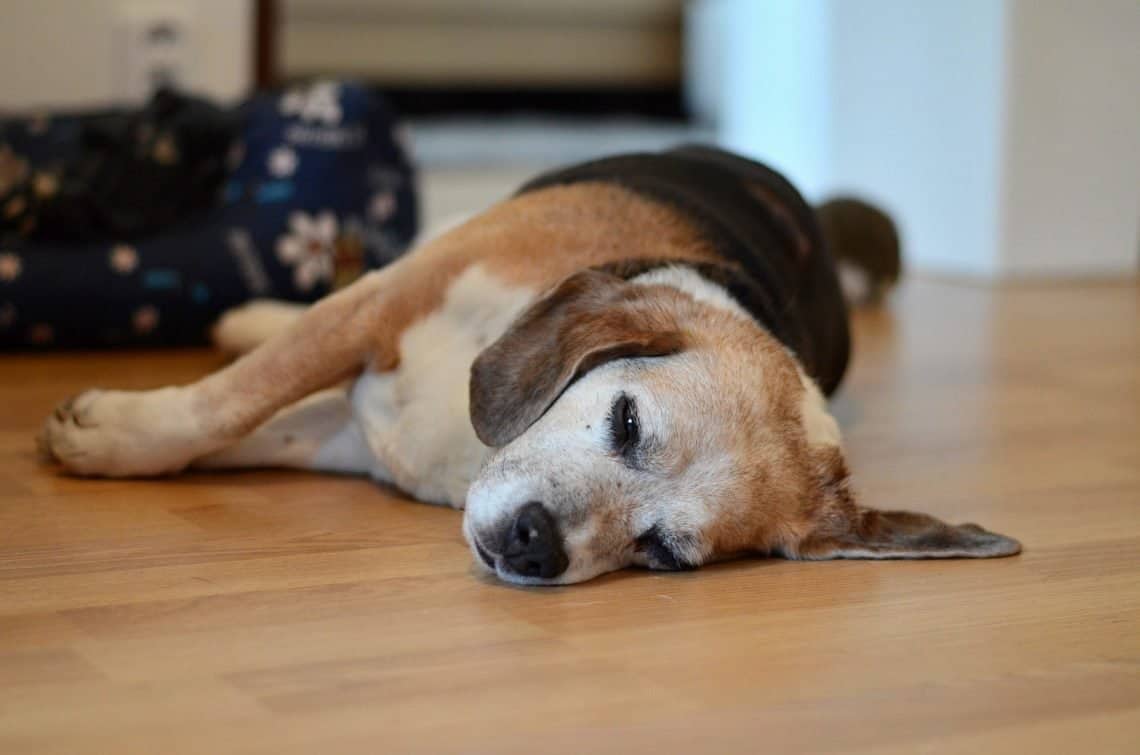It is not always easy to determine whether your dog is feeling sick or in pain.
They are magicians when it comes to hiding any illness until it’s too late.
The reason for that developed from their roots as wolves.
Just like many groups, packs or herds, sick and weak animals have a high risk of getting killed or being abandoned by their group.
So animals that are hurt or sick will only show signs when it’s practically too late for them.
As we have domesticated dogs for so many years, we should be able to tell if our furry companion isn’t feeling well, right?
The best way to quickly cure any illness is by noticing early signs and taking your dog to the vet immediately.
For this, here are 8 alarming signs your dog may be sick.
1. Distancing
Your dog might be ill if he starts to retreat to his crate, dog bed, or another room when he normally would lie near his family.
If he should be active and playful and is instead avoiding activity and interaction that may indicate that he is not feeling very well.
2. Breathing Issues
Every dog owner knows that snoring can get really intense when their pet is sleeping.
But there are many signs that you should be looking out for that may be caused by a respiration illness.
Symptoms include coughing, loud breathing, gagging, and nasal discharge.
You have to see a vet immediately if the gums and tongue of your dog are more blue-ish whereas they should be pink.
Learn how to spot any issues around your dog’s jowls.
3. Diarrhea
If the poop of your dog doesn’t contain any solid texture and is watery then your dog is suffering from diarrhea.
Diarrhea should be checked with your vet to determine if it’s caused by digestive problems or something else.
I always treat and prevent light diarrhea symptoms with lactose-free and low-fat yogurt.
The next day my dog is diarrhea-free. You can also add coconut rasps for the taste and health benefits.

4. Less or No Appetite
Dogs love food more than anything.
If there have been no changes in his food, daily schedule or circumstances and your dog refuses to eat then he might be ill and should be checked by a vet.
5. Runny and Cloudy Eyes
If your dog is constantly scratching himself, has diarrhea, dry skin and runny eyes then you could have an autoimmune reaction or other health issues.
Just like humans, dogs can also suffer from allergies to dust, pollen, mites or food.
A vet can perform an allergy test to determine the cause of this reaction.
6. Pain
Like I said before, dogs do not show any signs of pain and the absence of your dog’s whining is not an indicator that the pain can’t be bad.
He will most likely suffer quietly.
You should get help for your dog if you recognize swelling, fatigue, drooling, growling or if he doesn’t let you touch the seemingly painful spot.
Do not give your dog pain killers for humans as they can be deadly for dogs and rather visit the vet.
7. Dizzy or Confused
If your dog seems to have a problem keeping balance and wanders around aimlessly through your house that is probably an indication for a certain illness.
He can also experience neurological issues that come with
A sudden change in behavior should also concern you as dogs are pretty consistent with what they do and how they react every day.
Either way, a vet should have a look at your dog, especially if it’s a very young or very old dog.
8. Dull Coat
The skin and fur of a dog are great indicators of their health.
The shinier and smoother it is, the healthier your dog is.
If the coat of your dog is looking dull or even has bald patches which could be caused by parasites or other health problems.
Generally speaking, you should always keep an eye on your dog as nobody knows your dog as well as you do.
If you notice any changes in his body or behavior, go to a vet and consult him first before giving any medication.
Hair loss around the eye might be another sign of an illness.
How to Treat a Sick Dog
Pay attention to the exact symptoms your dog is showing and when they are occurring.
You can also write them down in case you will need them when visiting the vet.
Is he eating and drinking? Is he able to urinate and defecate? Does he have a fever or seizures?
Is he limping or in pain?
If your dog is vomiting, withhold any food for 12 to 24 hours and see if the symptoms get better.
Encourage your dog to drink some water to keep him hydrated and start with small amounts so he won’t throw it up.
If your dog didn’t throw up for 24 hours, you can give him some easily digestible food like white rice and cooked chicken for 1-2 days.
You can also add some cheese or yogurt which helps build up the bacteria in the intestine.
Split his food into 4 small meals per day and feed him one cup per 10 pounds of weight.
So if he weighs 40 pounds, you can feed one cup in the morning, lunchtime, afternoon, and evening.
Encourage your dog to rest while he is sick and restrict him from playtime so his body can heal.
Do not leave him outside in the backyard and provide him with a comfortable, quiet and warm space inside.

Do not leave him alone at home when he is ill and keep paying attention to his symptoms.
Do not hesitate to call your vet when in doubt.
When to Visit the Vet
There are certain symptoms that will require immediate veterinary care:
- Severe vomiting and diarrhea
- Bleeding
- Sudden behavior change
- Ingestion of foreign object or toxins
- Broken bones
- Breathing issues
- Seizures
- Unconsciousness
- Not producing urine
- Unable to defecate
- Shivering
- Sudden pain without a trauma
- Refusing to drink or eat for 24 hours
- Red/Swollen gums
- Runny nose or eyes
You can also learn how to spot the signs of a dying dog and what to do if your dog is of old age and his life is ebbing away.
How to Prevent Your Dog from Getting Sick
You cannot avoid that your dog will get sick someday but there are a few things that are totally preventable that will keep your dog healthy and happy.
Keep your home puppy-proof – Restrict your dog’s access to chemical cleaners and other household items that are dangerous for him.
Do not spray deodorant or any other chemical in the same room with your dog.
Lock away toxic foods – Do not give your dog access to any type of food or the garbage can.
Keep everything behind counters and closed up.
There are many beverages that most dog owners don’t know that they are toxic to dogs, like chocolate, avocado, bacon, sugar, raisins, grapes and so much more. Check this for more.
No table scraps – Never feed your dog food from the table.
Neither do you want to encourage begging and it’s not healthy for your dog.
Most human food is full of fat, oil, and seasoning, so a big no for any dog.
No over-the-counter medication – Never give your dog human medicine.
It will make him sicker and most are extremely deadly.
Vets can’t treat your dog as long as pain killers or other medicine is still in the system, so you are putting your dog’s life at risk.

Silvia Rosado
Wednesday 13th of May 2020
Hi, my son has an Aussie that is about 4 months old. She is 'afraid' of traveling in the car. She vomits or at least drools a lot. Now she won't walk to get to the car. My son doesn't know what else to do so he drags her to the car hoping that she will start walking on her own, but she doesn't. ..I don't think it is ok to drag her. ...How can she be trained to stop being 'afraid' of getting in and traveling in the car? ..Thank you.
Danielle
Wednesday 13th of May 2020
Hey Silvia,
If the drooling/non-walking is directly connected with walking to the car, I would rule out any urgent medical issue (however, do get your son's Aussie checked out by a vet if you're not sure).
That being said, some dogs just don't like being in the car and anticipate this by drooling excessively. On the other hand, it could also be due to not training the dog properly to like the car. Use lots of positive reinforcement with treats, toys etc. and start by short amounts of time in the car without actually driving. Dragging is not a solution as laid out in this article.
Closely watch her body language to evaluate if she's afraid or simply doesn't like it (although the getting sick issue could be amplified by not liking the car itself). Especially Aussies can be really sensitive to the loud noises inside a car.
Hope you'll be able to solve this, let me know! Danielle
Amy
Monday 27th of May 2019
I came back to this post so many times and wrote down the different signs. Thank you for your help!
Danielle
Wednesday 29th of May 2019
Thank you for sharing your this!
Marina
Monday 29th of April 2019
This is really interesting, You're an excessively skilled blogger. I have joined your rss feed and look ahead to in the hunt for extra of your excellent post. Additionally, I've shared your web site in my social networks
Danielle
Monday 29th of April 2019
Thank you Marina! I am glad that you like it.
Rolando Getchell
Wednesday 24th of April 2019
I have been absent for a while, but now I remember why I used to love this blog. Thank you, I'll try and check back more frequently. How frequently do you update your web site?
Danielle
Thursday 25th of April 2019
Thank you for your comment Rolando, I post a new blog post every second day!